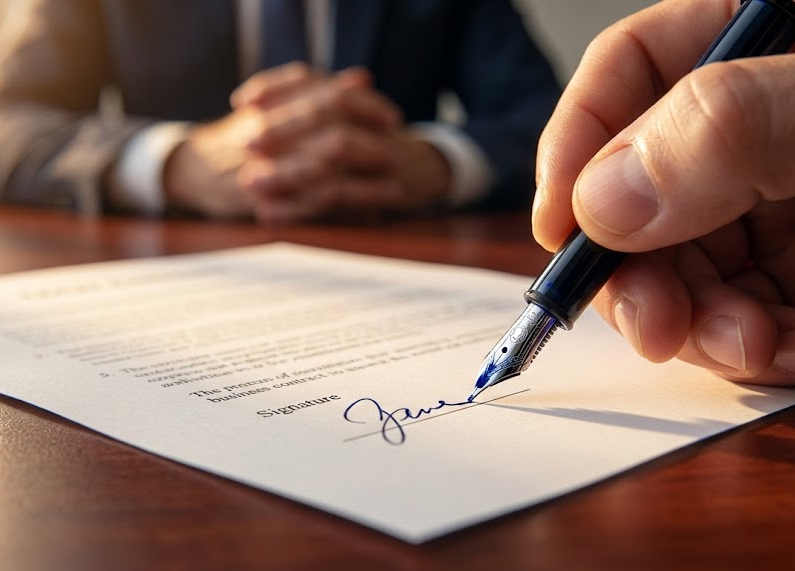When someone wants to transfer property ownership in the U.S. or ensure legal protection in real estate transactions, the concept of a notarized deed becomes essential.
Long story short, a notarized deed is a deed that has been officially authenticated by a notary public, confirming the identities of the signers and verifying that the document was signed willingly and knowingly. This notarization process gives the deed legal force and allows it to be recorded by local authorities!
In this article, we will break down what a notarized deed is, why it matters, how the process works, and the types of notarization available, including mobile and online services.
You may also like: Why you should notarize mortgage documents
What is a notarized deed?

A notarized deed is a legal document that transfers property interests and is authenticated by a notary public. This process ensures the verification of the identities of the parties involved in the signing.
A notarized deed confirms that the individuals involved in the signing of a document did so of their own free will and with full awareness of the implications. The notary includes a clause in said document, known as an acknowledgment or jurat, which formally confirms that the deed was signed in their presence and under the correct legal parameters.
In many states, a deed must be notarized before it can be legally recorded with the county recorder or land registry office. The notarization acts as a safeguard against fraud and provides a public record of the transaction. Without this step, even a perfectly written deed may not carry any legal weight or be enforceable.
There are several types of deeds that are commonly used in property transactions; each has its own legal nuances, but all typically require notarization.
- A Grant Deed, for example, transfers ownership and assures the grantee that the property hasn’t been sold to someone else and that it’s free from any encumbrances that haven’t been disclosed.
- A Warranty Deed offers an even stronger level of protection. It guarantees a clear title and pledges that the seller will defend the buyer against any future claims.
- Meanwhile, a Quitclaim Deed transfers any interest the grantor may have in the property without making any warranties about the title.
Despite their differences, the notarization requirement remains a consistent necessity among all of them, so that’s precisely our next topic.
Why is a notarized deed necessary?

Legal validity
A notarized deed ensures that the document will be accepted by the appropriate county office for recording. This step is not merely procedural, but foundational. You see, if the deed is not notarized, the local recording office may refuse to accept it.
This means the transfer of ownership is not officially recognized, and the new owner might face serious complications down the line.
Protection against fraud
Fraudulent real estate transactions are unfortunately more common than many realize. Unscrupulous actors may attempt to transfer ownership without the true owner’s knowledge or consent. A notarized deed provides a vital layer of security.
By verifying the identity of the signer and ensuring that the signing was done willingly, the notary acts as a neutral third party whose sole responsibility is to uphold the integrity of the transaction.
Legal weight in disputes
In the event of a legal dispute, a notarized deed stands as a powerful piece of evidence. Courts place a great deal of trust in documents that have been notarized, because they carry the assurance that the signers were properly identified and acted of their own volition.
This can be especially important in family matters, contested estates, or boundary disputes where the authenticity of the deed might be challenged.
There are 3 types of deed notarization!

1. Traditional In-Person Notarization
Traditional notarization involves the signer physically appearing before a notary public. The notary checks the signer’s government-issued identification, ensures that the individual understands the document, and watches as they sign.
Afterward, the notary applies their official seal and signs a notarial certificate, confirming the details of the act. This method is still widely used and trusted, especially in jurisdictions that do not yet accept online alternatives.
2. Mobile Notary Services
Mobile notary services bring the notary to the client’s preferred location. Whether it’s a private home, hospital, office, or coffee shop, the notary will travel to you. This approach is especially beneficial for those with limited mobility, hectic schedules, or urgent timelines, making it an increasingly popular choice nowadays.
Mobile notaries carry all necessary materials, including stamps, seals, and documentation, and they are trained to handle a wide variety of notarization scenarios with discretion and professionalism. Many Mobile Notaries offer after-hours services and weekend availability, providing much-needed flexibility in today’s fast-paced world.
3. Remote Online Notarization (RON)
Remote Online Notarization is a modern solution increasingly adopted in several U.S. states. In this process, the signer and the notary connect via secure video conferencing platforms.
Advanced technology is used to verify identity, such as knowledge-based authentication or biometric checks. Once identity is confirmed, the notary observes the signing electronically and applies a digital seal to the document.
This method is convenient and essential for long-distance transactions, such as when one party is out of state or even overseas.
How the general process works

Preparation
Before meeting with a notary, several preparatory steps should be taken to ensure the process goes smoothly.
First, the deed should be properly prepared and, ideally, reviewed by a real estate attorney or title company to ensure all legal language and details are correct. The signer must be aware of exactly where and how they are expected to sign. Having a valid government-issued photo ID is mandatory.
In cases where witnesses are required, those individuals should be informed ahead of time and ready to participate in the signing process.
During the meeting
During the meeting, the notary begins by confirming the identity of the signer. They ask relevant questions to ensure the individual understands the contents and implications of the deed. Once this is established, the signer is guided through the signing process.
The notary observes the signature being placed on the document, fills out the notarial certificate, and then affixes their official seal. If the deed does not contain a preprinted acknowledgment section, the notary attaches a separate acknowledgment form to complete the process.
Post-notarization
After the document has been notarized, the next step is submission. The notarized deed must be filed with the county recorder or the appropriate land registry office, which involves submitting the document itself, any supporting forms, and applicable fees.
It is crucial to follow the local requirements, as mistakes in this step can delay or invalidate the recording. Some notaries offer additional services, such as courier delivery to the recorder’s office, or scanning and sending copies to relevant parties.
It’s time to find a notary near you!
At the end of the day, a notarized deed is more than just a signed document; it’s a legally binding instrument that ensures the proper transfer of property ownership. Without proper notarization, the deed may not be accepted by public records offices and can leave room for legal vulnerabilities.

As mentioned, the rise of mobile notary services has made this essential process more accessible and convenient than ever. Whether you’re managing a last-minute property transaction, helping an elderly family member finalize estate plans, or buying a home from out of state, mobile notaries like us bring professionalism and peace of mind to the table.
And we here at Mobile Notary Orlando are proud of the availability and quickness of our service! If you’re preparing to transfer property or execute a real estate document in Orlando or Central Florida, get in touch with us as soon as possible.
We would love to add you to our list of clients and help you finalize your notarized deed at the time and place that works best for you!






